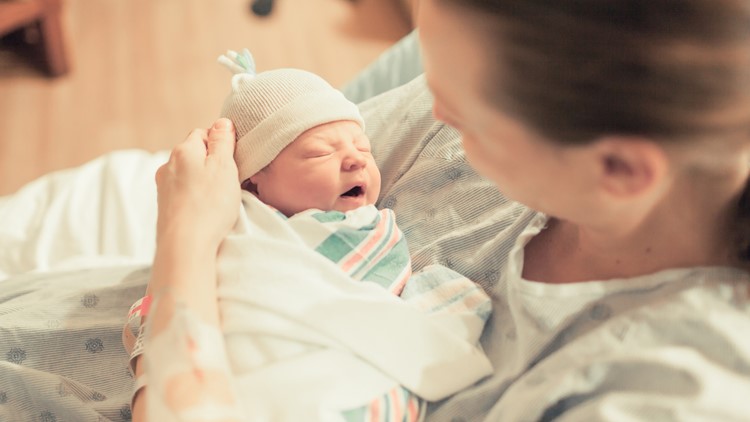IOWA, USA — Women in one-third of Iowa’s 99 counties have no access to birthing hospitals, birth centers or obstetric doctors, according to a March of Dimes report.
These "maternity care deserts" have grown more commonplace as the state has seen hospitals close down their labor and delivery services.
Between 2019 and 2020, March of Dimes reported a 6.7% decrease in birthing hospitals in Iowa. But, it's not just a recent issue Iowans have had to contend with.
A 2022 Iowa Department of Health and Human Services (HHS) study found 41 birthing units have closed since 2000.
Jasper County's sole delivery center, MercyOne Newton, will stop providing labor and delivery services on Oct. 15, forcing expectant mothers to go elsewhere.
Women in Jasper County can now expect to travel around 27 minutes and over 20 miles to the next closest birthing center at UnityPoint Health in Grinnell, much higher than both the national average (9.7 miles) and Iowa average (11.2 miles) for travel distance to a birthing center, March of Dimes notes.
Iowa women also face greater disparities of maternity care access than their counterparts across the country. 14% of Iowans had no birthing hospital within 30 minutes, compared to 9.7% nationwide.
Research shows these maternity care deserts place an increased risk on a woman's health and of their children. The farther a woman has to travel to receive care, the "greater risk of maternal morbidity and adverse infant outcomes, such as stillbirth and NICU admission," the March of Dimes report said.
The Iowa HHS study found women living in counties where the only birthing facility closed saw significantly higher rates of inadequate and severely inadequate prenatal care than in counties where facilities remained open.
The study also said access to maternity care is "critical for maternal and infant well-being."
Prenatal care can greatly impact the health of a child, as low rates are associated with increased negative outcomes, including stillbirth, premature birth and higher rates of admission into intensive care units, according to the Iowa HHS.
The impact of maternity care deserts hit rural women harder than those in urban areas, as they see longer travel times and more closures of labor and delivery services.
A 2024 report from the Center for Healthcare Quality and Payment Reform found of Iowa’s 94 rural hospitals, 62% did not have labor and delivery services.
A significant reason why 33% of Iowa's counties are maternity care deserts is because they can't find a supply of obstetric doctors.
“It's hard to find physicians that want to practice in Iowa. We don't have any mountains, we don't have any beaches,” Newton Clinic administrator Mark Thayer said in September. "There are some organizations that are offering very high salary packages that, quite honestly, we can't compete with."
2022 data from the American Journal of Obstetrics and Gynecology shows that Iowa has the lowest per capita ratio of OB-GYN providers of any state in the nation.



